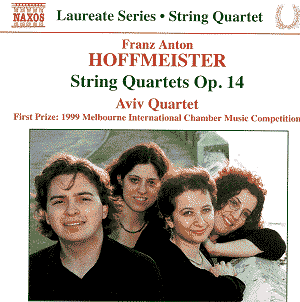Although Franz Anton Hoffmeister is best remembered
today as a publisher, his work-list is extensive and includes
over sixty symphonies and a number of operas, not to mention over
thirty string quartets. The three quartets on the present Naxos
disc date from around 1791. All three of them exude a most approachable
confidence that is more than adequately projected by the Aviv
String Quartet. His music is expertly crafted, gratefully written
an, above all, exquisitely charming without making any pretence
towards greatness.
This young Russo-Israeli quartet has evidently
earned its place in Naxos’ ‘Laureate Series’. The quartet was
formed as recently as 1997. The young musicians bring with them
a string of competition wins, and on the strength of the present
release these were fully deserved. The F major quartet, Op. 14
No. 1 is a case in point. The jolly first movement is suffused
with delightfully sprung rhythms; the Poco adagio breathes an
easy charm. The finale, with its fresh accents, confirms the invigorating
nature of the whole piece.
The B flat quartet is very much of the same ilk.
The concentration from the players in the first movement is most
commendable – it is as if they are saying, ‘We take this music
seriously and you should, too’. There are some lovely references
to hunting calls (appropriately for the chosen key) and in the
Romance Sergey Ostrovsky’s violin sings purely and sweetly. Interchanges
between violin and cello are beautifully rendered, while the almost
preternatural civility of the finale is peppered with surprisingly
explosive sforzandi.
As might perhaps be expected, entering the minor
mode for the final quartet on the disc leads to deeper thoughts.
The Vivace is indeed lively, but intense at the same time. The
stately and dignified Adagio cantabile matches this movement well.
The final movement effectively banishes the clouds.
An interesting excursion into one of the byways
of the string quartet repertoire. The recording is entirely acceptable.
A joy from first to last.
Colin Clarke
See also review
by Michael Cookson
